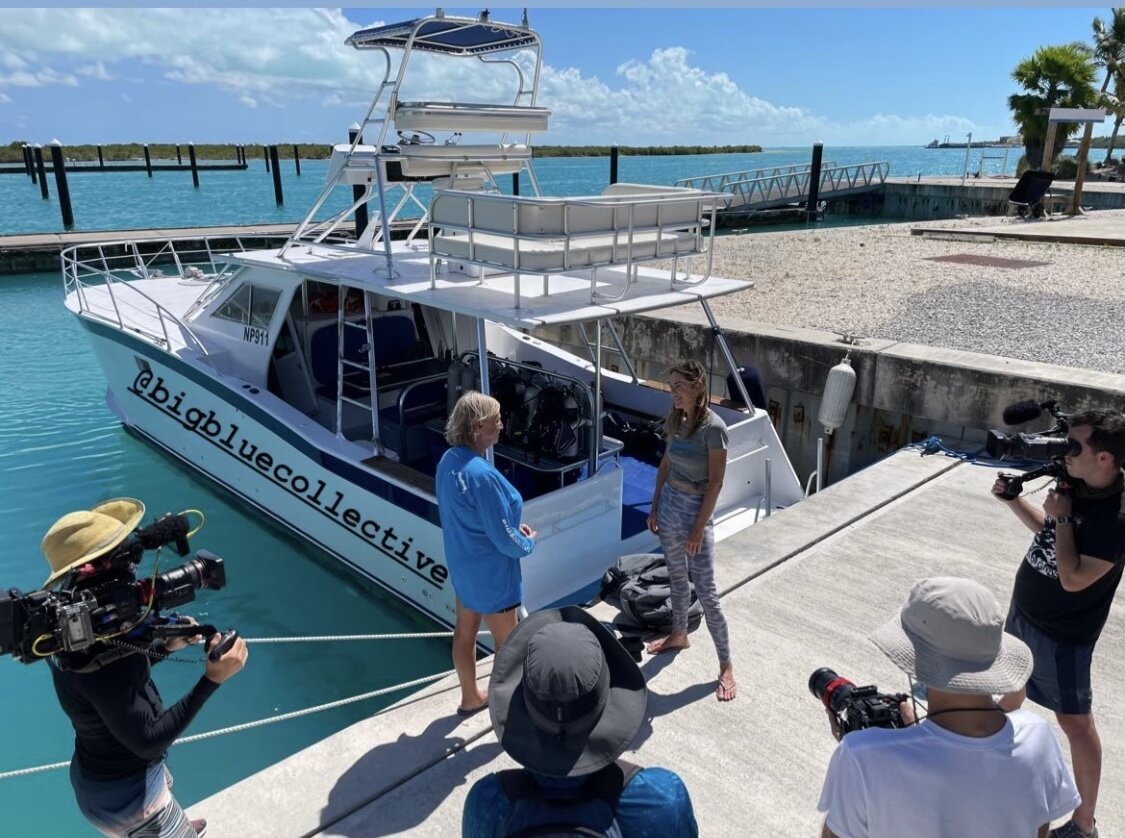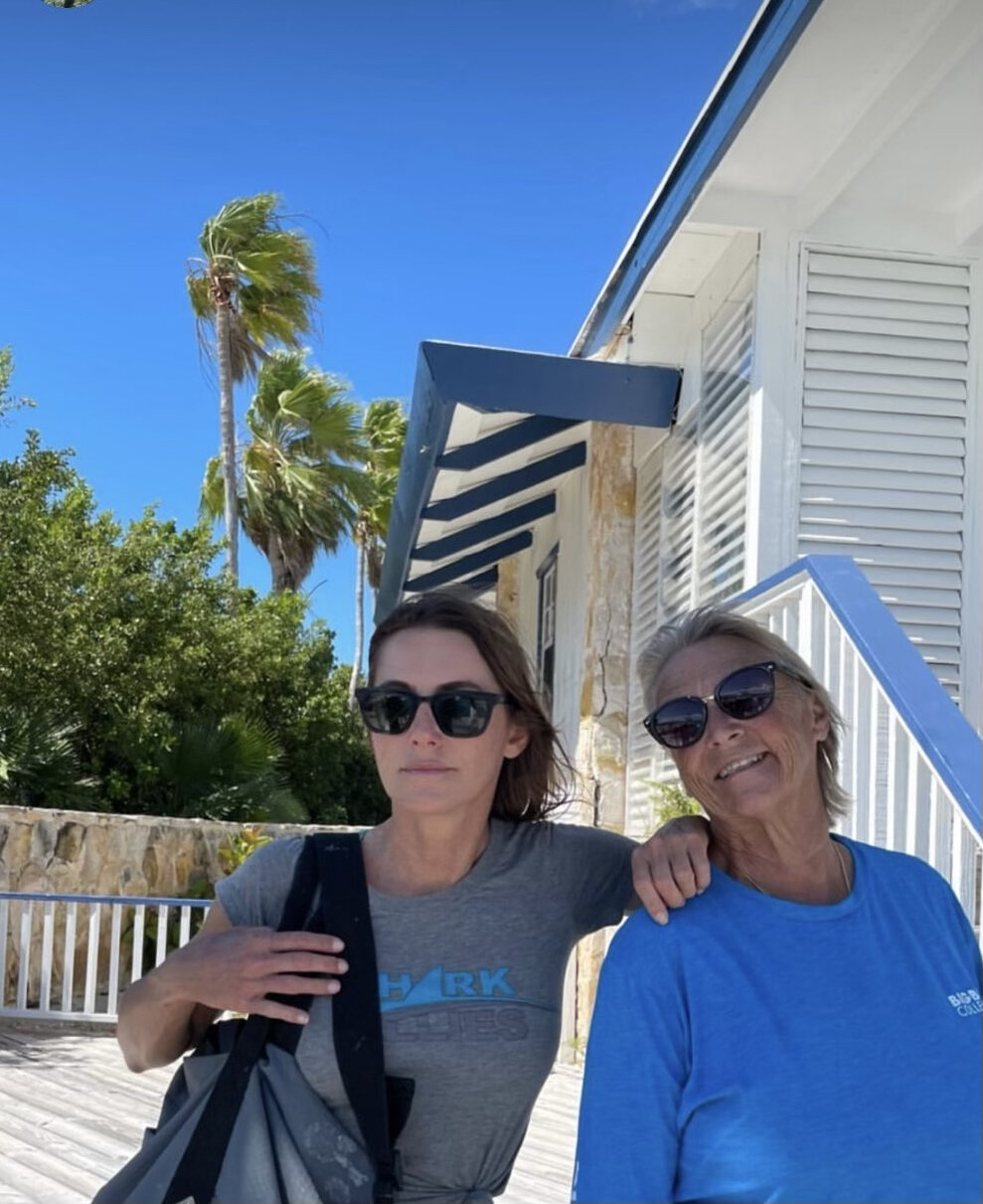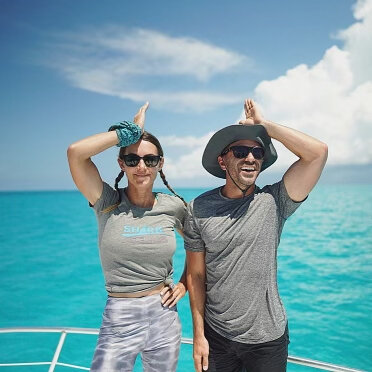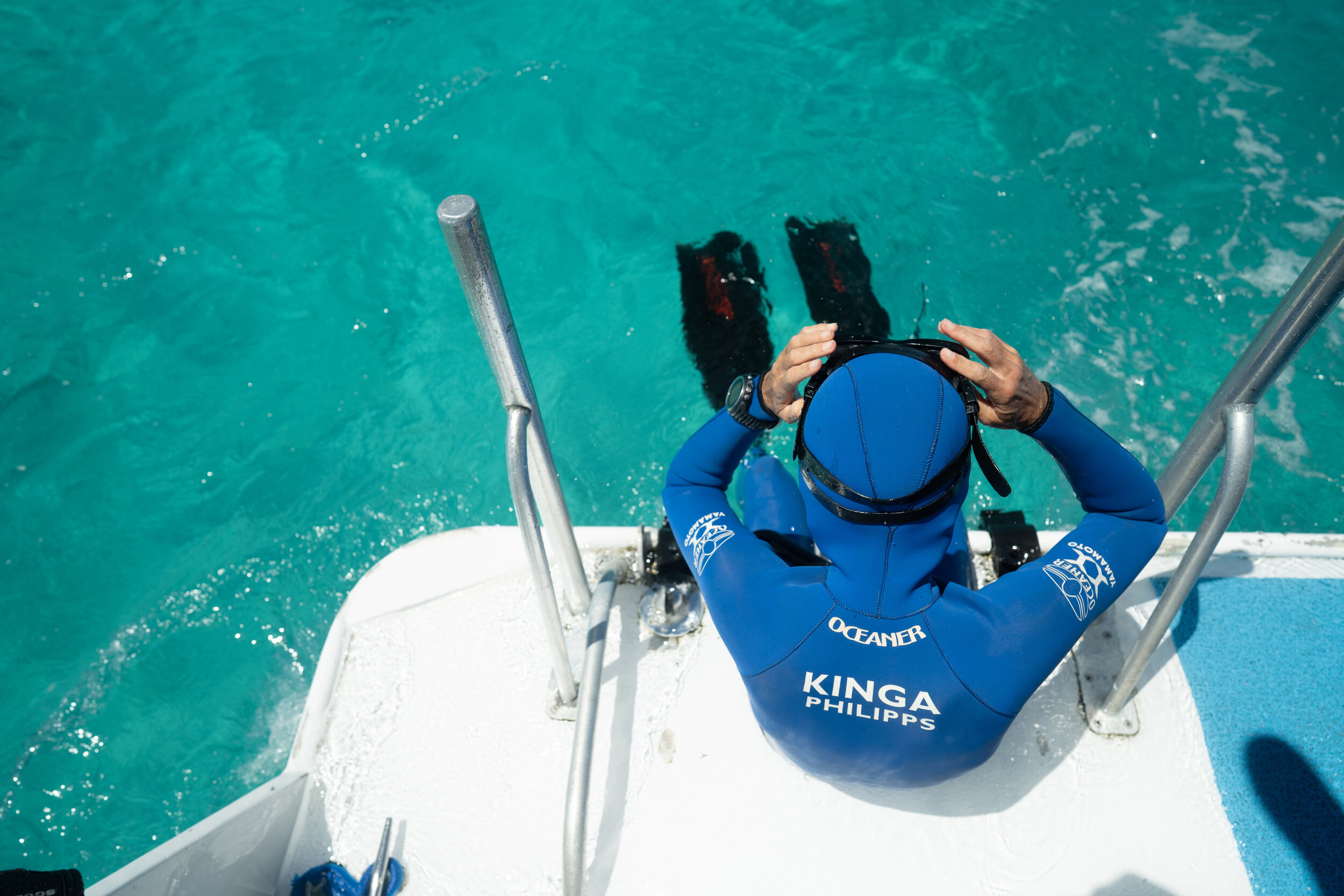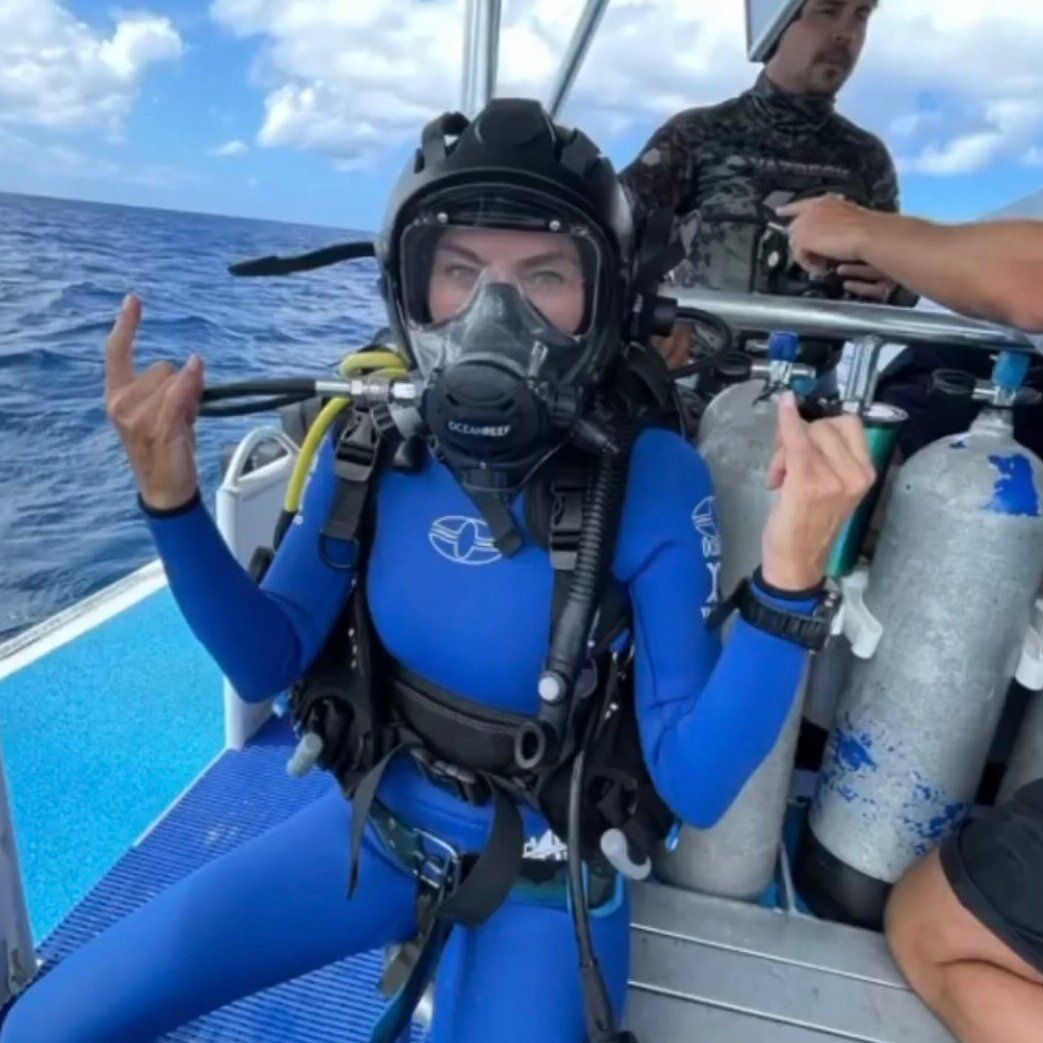Conservation Heroines: Kinga Philipps and Judy Dirckx
One of Shark Allies’ nearest and dearest, not to mention the first (non-celeb) female to host her own Shark Week special, Kinga Philipps, makes her Discovery debut today with ‘Tiger Queen’. Just as Kinga has proven to move the needle in the Explorers and Journalism spaces, she strikes yet again, making an impact on Discovery Channel, a usually male-dominated and sensationalized space. After drooling over the phone, listening to Kinga’s stories from production in Turks & Caicos, we knew I had to highlight not only her as our July Conservation Heroine, but the “Real Tiger Queen” of TCI, Judy Dirckx. You’ll soon read why…
LI: To start, one of my favorite stories: Can you tell us how you got involved with Shark Allies a decade ago?
KP: My absolute favorite story! About 10ish years ago, Shark Week held an online competition where you could bid on scientists and shark experts. The idea was that the money would go to conservation and if you won, you would get to take one of these cool folks to lunch. I thought this was amazing so I bid on everyone without reading the obvious fine print that they should at least be in the same time zone. Well, I guess it wasn’t super popular because I won everyone I bid on. I wrote them all and none of them wrote me back (tsk-tsk) except for Stefanie Brendl, out of Hawaii. She was very nice and I told her I'd love to meet her when I was in Hawaii. Long story short, we missed each other when I was there and then a year later I went, “wait a minute I want to hang out with that cool shark lady I won!” So, I wrote her again and it turned out she was in Los Angeles this time, so I took her to lunch and we became fast friends! Ten years later we're still working together to save sharks with Shark Allies!
LI: As one of our first members, what has been the most meaningful campaign, project, win or anything that Shark Allies has done (big or small)?
KP: Wow so many things. Before my time Stefanie Brendl being a force for the 2010 Hawaii fin ban that was the first one in the US is HUGE, getting the ball rolling for other states to join. The recent Florida fin bad is another HUGE win for sharks. The squalene in vaccines campaign was an incredibly successful opportunity to start a global conversation about shark products that people don’t know about and to discuss alternatives. Our overall mission to work with governments and locals to create Marine Protected Areas for sharks is a huge undertaking but the only way forward to protect these species. Even speaking with kids and painting murals is imperative to getting the next generation onboard with shark conservation.
LI: You have one of the most diverse resumes out there: journalist, explorer, conservationist, diver, TV host, producer, board member, sea lion saver, the list is endless. How did your not-so-conventional childhood shape who you are today?
KP: Haha! Well, we are all a product of how we grow up to some degree. I am the daughter of outdoors people and was introduced to travel and adventure and wildlife at a very early age. My parents instilled a love and respect for not only animals but their habitats. My background in travel has given me great insight to the plight of species, especially ocean animals. My work in media gives me a platform to share my passion and educate people where I can.
LI: A new role to add to your list, the first (non-celeb) female to host a Shark Week! Can you give us an inside scoop into your episode?
KP: YES! I am so excited. Tiger Queen will air on Discovery+ on Wednesday, July 14th as part of Shark Week! We go to Turks & Caicos to find a completely unstudied population of tiger sharks and literally dive into a mystery that surrounds them. It was an amazing adventure, and we get up close and personal with some big-big-big tigers….and a few other sharks. You’ll have to tune in to see!
LI: Something that many viewers may not know is that as a host, at least in your case, you are involved in every stage of production. Why did you think the tigers of TCI was an important story to tell?
KP: It’s actually a great story of how it all played out because, due to Covid, we were thwarted on two other locations that I wanted to go to. We had a story in place and were actively in pre-production when our locations became unreachable due to the pandemic. About that time, we found Judy Dirckx, a 25 year resident and diving veteran of Turks & Caicos and amazing human who I think is a shoe in for an interview here. She brought to our attention something very interesting, a seemingly resident population of tiger sharks. At first, I have to admit I was hesitant because I had not heard of regular tiger shark sightings in the islands. I even asked scientists and looked all over the internet. It just felt like it was an extremely rare occurrence. But after we talked to Judy, we soon realized there was something rather extraordinary happening in those waters, so we took a chance to see if we could be on the forefront of a really exciting discovery. The hunch paid off! As a member of Shark Allies, I was also drawn to this story because I feel strongly that in order to protect populations of sharks we need to study them and then make sure they, and their habitats, are protected. This was an opportunity to study a virtually unheard of population of tiger sharks and start the process of understanding their dynamics and migratory habits so we have the information we need to protect them.
Now, the moment I stopped Kinga to ask if we could feature her as our first Shark Café “Conservation Hero/Heroine” she immediately blushed, to insist that she was not the “Tiger Queen” we should be after, but Judy instead. After some back and forth with the “True Tiger Queen” herself, it became ubundantly clear that her story was an extremely important one to tell. Afterall, no one knows these TCI sharks like her.
LI: Judy! For those that do not know you already, can you give us a look into your life, how you became the true Tiger Shark Queen of TCI?
JD: I was born in raised in Winnipeg, Manitoba (Canada) lovingly referred to as "Winterpeg". As a child I was never fond of winter (still am not) and spent the winters at the YMCA or doing indoor sports. Summers were always amazing for me as we had many great lakes and I, of course, gravitated to the water. Finished school and became a paralegal, working in the legal field. My mother worked for an airline so I was able to travel a lot and, of course, most of my trips were to warm, island destinations. In January 2001 I came to the Turks and Caicos on vacation and stayed with friends who had been coming here for years. They introduced me to snorkeling (had never done it before) in these beautiful waters. Met some wonderful people here during that time and was offered a job, so moved here permanently in December 2001. I did my first DSD in October 2002, quite nervous at first but once I saw the magic underwater and that I could stay down there, I was hooked. I then decided I would pursue my diving dreams and became a divemaster in March 2003 and have never looked back.
Because I was able to spend all of my free time and every weekend in and/or underwater, I have been blessed with many incredible encounters that most people never experience. I decided that I wanted to travel all over the world, so I took extra training so that I would be capable of handling all types of water conditions throughout the many places I wanted to visit. I have dove with and have seen many different species of sharks: Cocos Islands (8x), Socorro, Bat Islands Costa Rica (6x), Sardine Run South Africa, Tiger Beach (x3).
LI: You dive with the magnificent underwater residents of TCI day in and day out. Do you have favorites stories? What makes the sharks of TCI so special to you?
JD: TCI is very special as it is the Atlantic Ocean, not the Caribbean. A lot of the marine life depends on the season. Fortunately for us, there are some sharks here year-round, making it very unlikely NOT to see a shark when on scuba. There are some resident sharks that have been here since I first started diving and it never gets old seeing them. We have reef sharks, lemons, nurse, great hammerheads to name a few but my favorite is, of course, the tiger. It is not usual to see tiger sharks when diving and as you will see from our Shark Week episode, most people don't even realize they are here. I, fortunately, have had a number of encounters with these magnificent creatures during my time here. Our reefs are quite healthy and we have an abundance of reef fish, so the sharks don't go too far away… easy dinners.
LI: Let’s dive into your Shark Week special. Have you ever done anything quite like it before?
JD: I think the best part of my 2 week involvement with all of this is knowing that we have so much to offer and I believe we surprised a lot of people who were unaware of all that we can show to the world. I loved that I was able to share some of my shark diving experiences with some of the local dive instructors here who are in the waters here every day and had never had those experiences.
LI: In your lifetime, how has the ocean changed? Do you have any hopes for the protection of your sharks?
JD: Since 2002, we have had many hurricanes here which, of course, can change countless things in our underwater world. Luckily, our reefs continue to be some of the most beautiful. I also believe that during the Covid lockdowns, our oceans got a chance to heal as there were less boats, cruise ships, etc. We are seeing many different species thriving. With the help of our on Island conservation minded sponsors (Big Blue Collective) and the international research teams that are now studying our waters, we will be able to provide some amazing data to the government agencies here in an effort to have them continue to protect our beautiful waters.
With that, back to Kinga!
LI: Without giving anything away, your special is a perfect case study on the first steps to making an impact for sharks. What do you hope comes from this episode?
KP: I worked with Dr. Austin Gallagher and his organization, Beneath the Waves. He has been studying populations of tiger sharks across the Caribbean, but this was virgin territory for science AND conservation so we were super eager to get data on these sharks to help us form a picture of their habits. Knowledge is imperative in understanding how to protect populations.
LI: It’s no secret that shark populations are feeling the pressures of overfishing worldwide. In your opinion, how can we best address these issues? Where should we prioritize protections?
KP: There are many, many steps to this from fin bans to limiting bycatch to better understanding of shark patterns so we can better protect them. The greatest overall achievement that is truly the only way forward for shark species is the creation of Marine Protected Areas: creating sanctuaries for sharks as we would for land animals. If we can create parks for elephants and rhinos to protect those fragile species, we must do the same thing for ocean animals. And, in the same way we need to make sure we incentivize their protection for local governments and people by creating and measuring a revenue stream to show value. Shark tourism and diving are MASSIVE draws. Healthy reefs are what people want to see. Healthy reefs have sharks. Locals and governments should be able to have data that clearly shows that sharks are worth more alive than dead and it's a massive economic boost to protect them and their habitat. Local people need to want to protect their animals and financially benefit from them being alive and healthy, rather than being drawn to killing them for fins and meat because they have no other sustainable alternative. These areas also need to be enforced because protection without enforcement doesn't work. This all carries a hearty investment but it’s not only the only way to truly protect these animals but also the opportunity to pay for itself in the long run.
LI: One question we get time and time again at Shark Allies is, “how can I do what you’re doing?” It is clear that there is no perfect formula to making a difference. If you could give any piece of advice on how to make a difference, what would it be?
KP: It’s true that there is no simple answer but simply getting involved where you can is the best start. Most organizations, like Shark Allies are non-profits, so helping where you can goes a long way. It’s certainly not always glamorous. People often want to get involved to “swim with sharks”. What organizations often need most are everything from graphic designers to fundraisers to keep the campaigns going. Obviously, getting a marine biology degree and heading into a field of study that will have an impact is tremendous for those who want to make it their life work. Education is terrific. We work with artists and teachers who pass their passion onto future generations.
LI: Do you think that Kinga, circa family road trips and studying roadkill and rocks, would be surprised with where you are today? What are you most proud of?
KP: I actually think she would be like, “yea, that figures.” Hah! I’m always proud when someone reaches out to let me know that they now have a better understanding of sharks because of a project I participated in. Change happens in waves and every person makes a difference.
LI: What’s next on the agenda for Kinga?
KP: Working on a few sharky media projects that I think will be really exciting. And of course getting in the ocean as much as possible.
Tune in to Judy and Kinga’s Shark Week special ‘Tiger Queen’ on Wednesday, July 14th on Discovery+.







